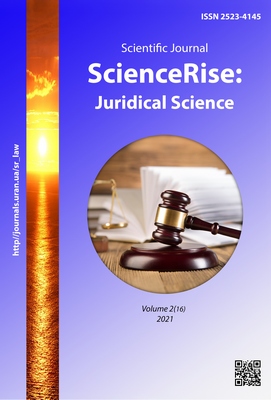Theoretical and legal characteristics of problem aspects of free secondary legal aid and prospects of their solution
DOI:
https://doi.org/10.15587/2523-4153.2021.235118Keywords:
human rights, legal aid, free secondary legal aid, lawyer, protectionAbstract
The article analyzes problems of providing free secondary legal aid in Ukraine. Based on the studied statistical indicators, it is determined, that the most unresolved issues are the availability and quality of legal aid. It is stated, that in order to overcome these obstacles, the state, represented by the authorized bodies, cooperates with many international organizations, participates in international technical assistance projects and provides communication with international and national public organizations. Based on the study, it is noted, that today attention should be paid not only to highlight the possibility of obtaining free secondary legal aid, but also to the dissemination of mechanisms for obtaining such assistance and their features. It is determined, that today in Ukraine the state and public organizations are actively working to increase the level of availability of free legal aid in Ukraine. The Law of Ukraine «On Free Legal Aid» contains a detailed list of persons entitled, in particular, to receive free secondary legal aid, the rights and obligations of entities to provide such assistance. However due to the abstract nature of legal norms and the style of their presentation, there is a need in society to explain these regulations to the population. To this end, various activities are carried out, in particular, cooperation with the media, publishing brochures, distributing educational videos on the Internet, which has a positive character and, as a consequence, achieving the goal – increasing the availability of free legal aid in Ukraine. The participation of representatives of the international community in providing free legal aid is analyzed. It was stated, that the representatives of the Council of Europe recommended that the national institutions improve the legal framework for the provision of free legal aid in order to make the institution more accessible and understandable to those entitled to receive it. In addition, the Council of Europe recommended improving the area of criminal justice in terms of coherence of efforts to provide each suspect or accused with affordable and quality legal assistance. It is noted, that the quality of free legal aid depends on many factors. In particular, lawyers discussed the thesis of incentives to provide quality assistance, as in a significant number of cases the lawyer interferes with concentration, and as a consequence, reduces the level of positive decisions. It is determined, that free legal aid does not provide support to citizens in applying to international judicial institutions, such as the European Court of Human Rights
References
- Stamatina, M. (2012). The notion and the essence of free legal aidin Ukraine. Pravo i bezpeka, 4, 135–139.
- Moskvich. L. M. (2017). The Role of Advocacy in the Administration of System of Free Secondary Legal Aid in Ukraine. Forum prava, 1, 124–126.
- Choudhury, D. (2016). Concept of Free Legal Aid- a Comparative Analysis Free Legal Aid in India, United Kingdom and Australia. International Journal of Law and Legal Jurisprudence Studies, 3 (3), 104–120. Available at: http://ijlljs.in/wp-content/uploads/2016/07/cpl1_FINL.pdf
- Pro bezoplatnu pravovu dopomohu (2011). Zakon Ukrainy No. 3460-VI. 02.06.2011. Vidomosti Verkhovnoi Rady Ukrainy, 51, St. 577.
- Polozhennia pro tsentry z nadannia bezoplatnoi vtorynnoi pravovoi dopomohy (2012). Nakaz Ministerstva yustytsii Ukrainy No. 967/5. 02.07.2012. Available at: http://zakon.rada.gov.ua/laws/show/z1091-12
- Statystychni dani shchodo diialnosti bezoplatnoi vtorynnoi pravovoi dopomohy. Dani Koordynatsiinoho tsentru z nadannia pravovoi dopomohy. Available at: http://old.legalaid.gov.ua/ua/statistics-ukr
- Breus, S. M. (2017). The content of the right to free legal aid and prospects of its legislative regulation implementation mechanisms. The Scientiic Papers of the Legislation Institute of the Verkhovna Rada of Ukraine, 1, 19–23.
- Rishko, M. (2016). Problems and prospects of legal aid system in the Ukraine. Pravo, 31, 95–101.
- Quality and Accessible Legal Aid in Ukraine. Available at: http://qala.org.ua/uk/
- Hutnikov, A. (Ed.) (2006). Rezoliutsiia (78) 8 Komitetu Ministriv Rady Yevropy pro yurydychnu dopomohu ta konsultatsii vid 2 bereznia 1978 r. Zbirnyk dohovoriv Rady Yevropy. Saint Petersburg: Parus, 254.
- Buriak, Ya. Ya. (2018). Procedure for provision of security secondary legal aid in the civil process. Yurydychnyi naukovyi elektronnyi zhurnal, 2, 60–62.
- Yanovska, O. G. (2013). General principles of providing of free legal aid in criminal proceedings. Naukovyi visnyk Dnipropetrovskoho derzhavnoho universytetu vnutrishnikh sprav, 4, 268–274.
- Stamatina, E. V. (2012). Administrative-Legal Performance of Instituteof a Legal Assistance in Ukraine. Forum prava, 3, 718–722.
- Pro zatverdzhennia Standartiv yakosti nadannia bezoplatnoi vtorynnoi pravovoi dopomohy u tsyvilnomu, administratyvnomu protsesakh ta predstavnytstva u kryminalnomu protsesi (2017). Nakaz Ministerstva yustytsii Ukrainy No. 4125/5. 21.12.2017. Available at: http://zakon.rada.gov.ua/laws/show/z1554-17
- Zaborovskyi, V. V. (2016). Advokat yak subiekt nadannia pravovoi (profesiinoi pravnychoi) dopomohy. Porivnialno-analitychne pravo, 2, 248–250.
- Koordynatsiinyi tsentr z nadannia pravovoi dopomohy. Available at: http://legalaid.gov.ua
Downloads
Published
How to Cite
Issue
Section
License
Copyright (c) 2021 Larysa Nalyvaiko, Maryna Novikova

This work is licensed under a Creative Commons Attribution 4.0 International License.
Our journal abides by the Creative Commons CC BY copyright rights and permissions for open access journals.
Authors, who are published in this journal, agree to the following conditions:
1. The authors reserve the right to authorship of the work and pass the first publication right of this work to the journal under the terms of a Creative Commons CC BY, which allows others to freely distribute the published research with the obligatory reference to the authors of the original work and the first publication of the work in this journal.
2. The authors have the right to conclude separate supplement agreements that relate to non-exclusive work distribution in the form in which it has been published by the journal (for example, to upload the work to the online storage of the journal or publish it as part of a monograph), provided that the reference to the first publication of the work in this journal is included.








